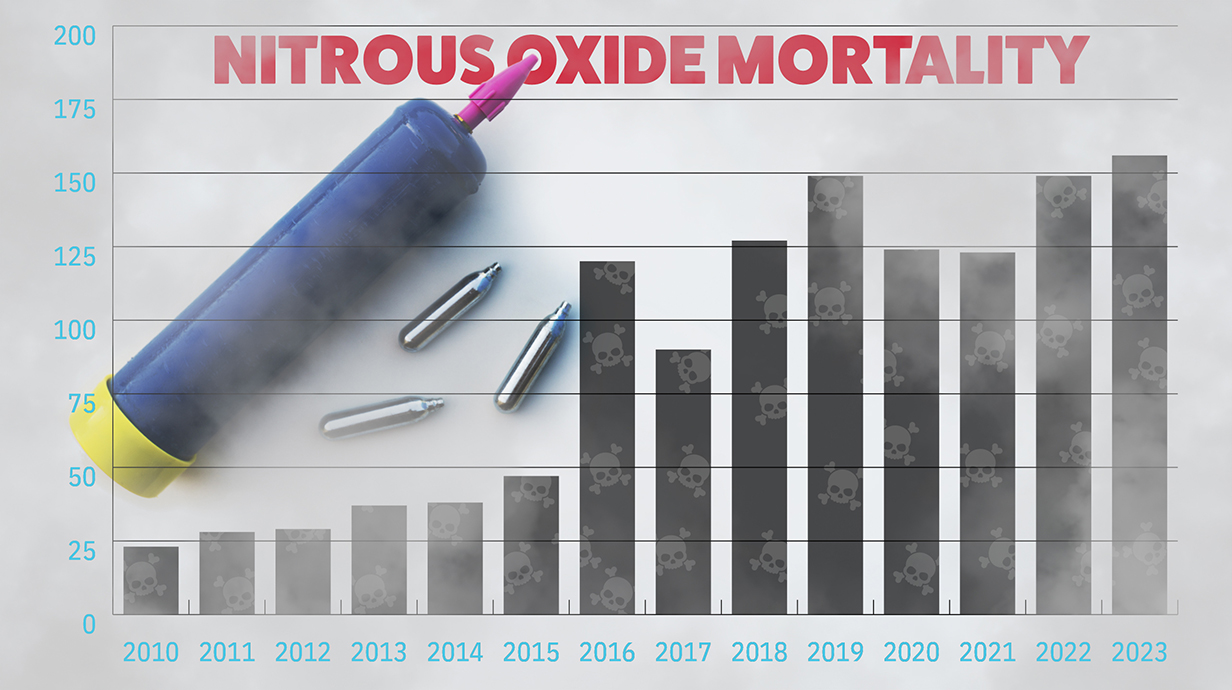Nitrous Oxide Deaths Spike by More Than 500%, Study Finds
Researchers conduct country's first comprehensive study of 'laughing gas' deaths

OXFORD, Miss. – Nitrous oxide deaths in the United States spiked by more than 500% between 2010 and 2023, a new study indicates.
Andrew Yockey, University of Mississippi assistant professor of public health, and Rachel Hoopsick, assistant professor of health and kinesiology at the University of Illinois at Urbana-Champaign, completed a first-of-its-kind study of nitrous oxide-related fatalities. The researchers published their findings in JAMA Network Open.
"This is not local to one area; it's everywhere," Yockey said. "And it absolutely deserves national surveillance. The numbers are still small right now, but they're growing and they're growing fast.
"How long do we have to wait before we consider this a problem?"

Nitrous oxide, commonly referred to as "laughing gas" or "whippets," is often used medically or in some food preparation. But it's also being increasingly misused as a recreational inhalant.
Hoopsick and Yockey studied 14 years of CDC WONDER data and found that nitrous oxide-related deaths were relatively low in 2010 with 23 deaths, but climbed to 156 in 2023, a 578% relative increase over time.
"What's especially concerning is how accessible and deceptively safe nitrous oxide seems," Hoopsick said. "It's legal, easy to buy and often viewed as harmless. But frequent or high-volume use can lead to serious neurological damage, psychiatric symptoms or even death.
"We're particularly worried about young people experimenting without understanding the risks. The rise in harm calls for not only prevention, but also stronger harm-reduction strategies."
The reason for the drastic increase in misuse is not clear, but Yockey said it coincides with the availability of nitrous oxide canisters sold online and other places.
"From about 2020 on, you really started to see two things: nitrous oxide products appearing in gas stations, online, etc., and then in 2023, the U.K. banned nitrous oxide," he said. "I think that's when some of those products started creeping in globally."
Yockey and Hoopsick began studying the upward trend in misuse in early 2025, when the Food and Drug Administration issued a warning about the dangers of inhaling nitrous oxide. The FDA's warning lists 15 products, but the researchers said dozens of nitrous oxide canisters – often sold with appealing flavors such as blueberry, cotton candy and even flavored nozzles – are on the market.
"We started researching nitrous oxide misuse after seeing headlines about young people dying from what many believed was a harmless substance," Hoopsick said. "Around the same time, we were both hearing anecdotal reports of nitrous oxide use among students on our respective campuses.

"These weren't just isolated incidents; they pointed to a larger, overlooked public health issue."
When inhaled, nitrous oxide can cause a range of ailments including blood clots, frostbite, asphyxiation, heart palpitations, paralysis, hallucinations and, in some cases, death. Prolonged use can also lead to spinal cord and brain damage.
The researchers also noted that youths are reported to be the most common users of nitrous oxide, with eighth graders making up a large portion of those misusing inhalants.
"There is no age limit, and this is available online and in gas stations across the country," Yockey said. "So, these products become an easy way to get high, and the companies know that. These flavored nozzles – bubblegum, mango – tell me these aren't being marketed to kids?"
Given the implications for public health, the researchers said there is a need for intervention both at the community level and at the policy level for increased monitoring and prevention.
"Public awareness is far behind where it needs to be," Hoopsick said. "Most people – including parents, educators and even some health care providers – don't realize how common nitrous oxide use has become or how dangerous it can be.
"I want them to know that legal doesn't mean safe and that early, nonjudgmental conversations can make a real difference."
Top: Nitrous oxide-related deaths in the United States climbed from 23 deaths in 2010 to 156 in 2023, a 578% increase over time, according to a recent study. Graphic by John McCustion/University Marketing and Communications
By
Clara Turnage
Campus
Office, Department or Center
Published
July 30, 2025
